Digital Poster
Diffusion Microstructure
ISMRM & ISMRT Annual Meeting & Exhibition • 10-15 May 2025 • Honolulu, Hawai'i

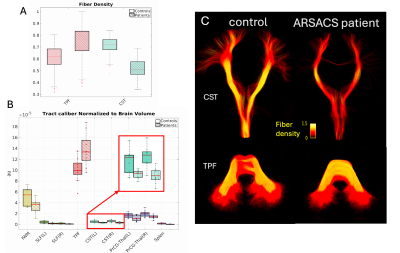 |
Computer Number: 65
3875. Dual
Encoded MT and Diffusion Provides Microstructural Insight in
ARSACS Disease
I. Leppert, A. Benbachir, J. Campbell, M. Nelson, B. Brais,
G. Pike, R. La Piana, C. Tardif
McConnell Brain Imaging Centre, Montreal Neurological institute and Hospital, Montreal, Canada
Impact: Our results obtained through advanced MR
techniques are in contrast with the previous hypothesis that
the TPF ‘squeeze’ the CST in ARSACS, thus causing their
abnormal development. Our observations have a direct impact
on the understanding of this disease.
|
|
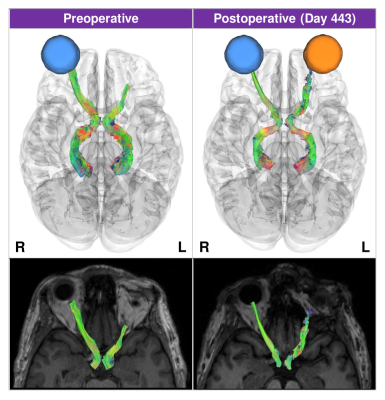 |
Computer Number: 66
3876. MRI
study of the optic nerve in the first whole eye and face
transplant patient
P. Filipiak, K. Clarke, A. Shah, S. Chinta, D. Tran, Z. Ben
Youss, O. Hassanin, V. Dedania, M. Bruno, E. Stein, Y. Lui,
D. Ceradini, E. Rodriguez, S. Baete
Bernard and Irene Schwartz Center for Biomedical Imaging, Department of Radiology, NYU Langone Health, New York, United States
Impact: This preliminary study demonstrates plausibility
and reproducibility of probing postoperative changes to the
transplanted ON noninvasively with MRI.
|
|
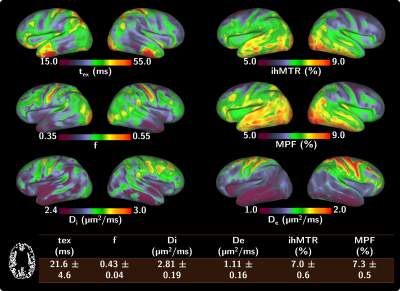 |
Computer Number: 67
3877. Neurite
Exchange Imaging cross-validation against ihMT and MPF in the
human brain
A. Hertanu, Q. Uhl, T. Pavan, S. Mezzano, T. Feiweier, T.
Troalen, G. Duhamel, O. Girard, L. Soustelle, I. Jelescu
Dept. of Radiology, Lausanne University Hospital (CHUV) and University of Lausanne, Lausanne, Switzerland
Impact: We performed a cross-validation of the
sensitivity of NEXI-derived membrane permeability with
myelin content, and neurite density with macromolecular
proton fraction in the human brain, thus paving the way for
the translation of NEXI to studies on patient populations.
|
|
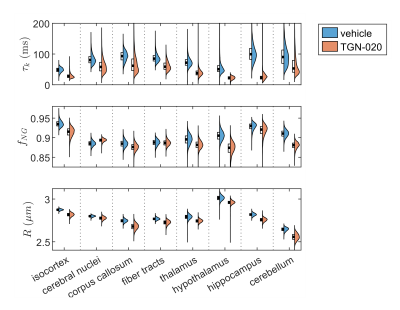 |
Computer Number: 68
3878. Aquaporin-4
inhibition in the mouse brain leads to apparent cell shrinkage
as measured by double diffusion encoding
T. Cai, M. Tachrount, N. Williamson, P. Basser, K. Miller
National Institutes of Health, Bethesda, United States
Impact: The modulation of water permeability by
aquaporins is important to normal brain function and
pathology. We present a method to disentangle the apparent
cell size, occupancy, and exchange time, to provide insight
into the microstructural effects of aquaporin-4 inhibition.
|
|
|
Computer Number:
3879. WITHDRAWN |
||
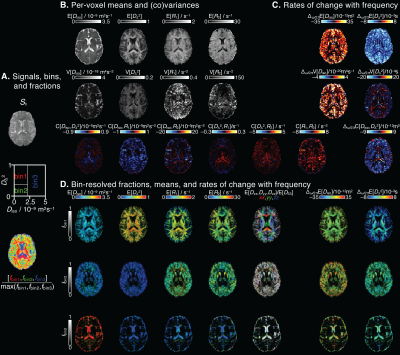 |
Computer Number: 69
3880. Whole
brain diffusion-relaxation multidimensional MRI protocol with
extended frequency range
J. S. Park, M. O. Irfanoglu, G. Gilbert, D. Topgaard, D.
Benjamini
National Institute on Aging, Baltimore, United States
Impact: We
introduce a diffusion-relaxation multidimensional MRI
protocol that maximizes the diffusion frequency range within
feasible scan times, enhancing sensitivity to diffusion
frequency dependency, allowing the investigation of
restricted diffusion, diffusion time dependency, and their
relationship with brain microstructure in vivo.
|
|
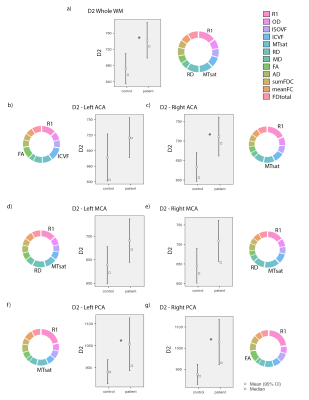 |
Computer Number: 70
3881. Multivariate
white matter microstructure in coronary artery disease: links to
aerobic fitness and cognition
Z. Potvin-Jutras, S. Tremblay, D. Sabra, A. Rezaei, S.
Sanami, C. Gagnon, B. Intzandt, A. Mainville-Berthiaume, L.
Wright, I. Leppert, C. Tardif, M. Gayda, C. Steele, J.
Iglesies-Grau, A. Nigam, L. Bherer, C. Gauthier
Concordia University, Montreal, Canada
Impact: Our findings indicate that higher white matter
alterations in patients with coronary artery disease could
increase the risk of cognitive deficits, while higher
cardiorespiratory fitness may preserve white matter health,
potentially aiding in the management of the disease.
|
|
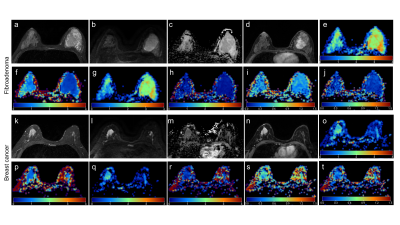 |
Computer Number: 71
3882. Quantitative
Evaluation of Multi-dimensional Diffusion MRI in Breast Cancer
Diagnosis and Molecular Subtypes Prediction
Y. Tao, J. Zhang, J. Xie, Z. Ai, Y. Zhang
the Fifth Affiliated Hospital of Sun Yat-sen University, zhuhai, China
Impact: MD-dMRI enhances breast cancer diagnosis and
subtype identification, improving precision medicine. It
offers non-invasive, accurate insights into tumor
heterogeneity, guiding personalized treatment and
potentially improving patient outcomes and survival rates.
|
|
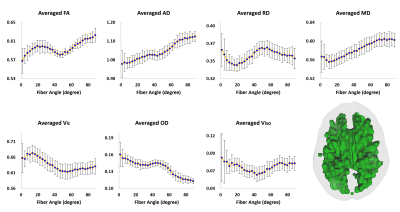 |
Computer Number: 72
3883. Fiber
orientation dependence of diffusion MRI in whole-brain white
matter
J. Zhou, J. Tian, Q. Ye
University of Science and Technology of China, Hefei, China
Impact: The
substantial orientation-dependent variations in diffusion
parameters suggest that current techniques, which do not
account for this orientation effect, might be biased.
Further work to fully explore and correct for the
orientation effect is vital for accurate quantitative
analysis.
|
|
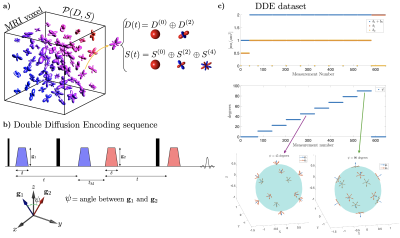 |
Computer Number: 73
3884. Microscopic
kurtosis tensor invariants and DDE 4-fold angular modulation in
human brain diffusion MRI
S. Coelho, E. Fieremans, D. Novikov
New York University Grossman School of Medicine, New York, United States
Impact: We observe for the first time a 4-fold angular
modulation of double diffusion encoding signal in the human
brain in vivo. This validates the presence of higher-order
tensor anisotropies in brain microstructure, which we fully
quantify at the $$$b^2$$$ level.
|
|
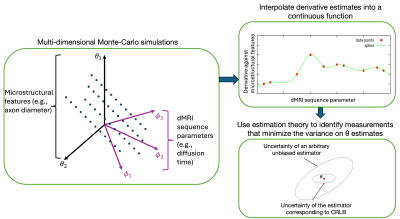 |
Computer Number: 74
3885. Optimising
diffusion MRI measurements to maximise microstructural feature
sensitivity using Monte-Carlo simulations and estimation theory
Z. Zheng, K. Miller, M. Tachrount, K. Szulc-Lerch, B.
Tendler, M. Cottaar
University of Oxford, Oxford, United Kingdom
Impact: We present a sequence optimisation framework
combining Monte-Carlo simulations with estimation theory.
The framework is applicable to a broad range of tissue
substrates and dMRI sequences. It identifies a combination
of dMRI measurements that maximise sensitivity to target
microstructural features.
|
|
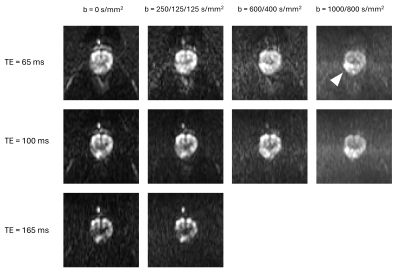 |
Computer Number: 75
3886. Implementation
of hybrid multi-dimensional MRI (HM-MRI) for non-endo-rectal
coil prostate MR imaging
M. Medved, A. Chatterjee, A. Lorente Campos, B. Gundogdu, S.
Huang, A. Oto, G. Karczmar
The University of Chicago, Chicago, United States
Impact: A successful and validated implementation of
hybrid multi-dimensional MRI (HM-MRI) without the use of an
endorectal coil will lead to broader clinical application,
resulting in better prostate MRI diagnostic performance and
better predictive value of prostate MR-guided biopsy.
|
|
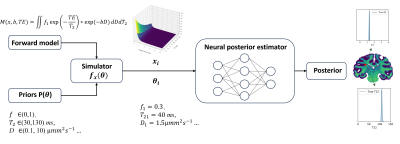 |
Computer Number: 76
3887. Simulation-based
amortised inference for analysis of multi-dimensional spectra in
combined diffusion-relaxation MRI
Y. Liu, S. Jbabdi, K. Miller, A. Howard
Wellcome Centre for Integrative Neuroimaging, FMRIB Centre, Nuffield Department of Clinical Neurosciences, University of Oxford, Oxford, United Kingdom
Impact:
This study applied simulation-based inference to multi-dimensional MRI, enabling rapid, precise and robust microstructural tissue characterisation. SBI’s computational speed will particularly benefit high-dimensional data, as the number of parameters grows exponentially with dimensions in classical inference, making conventional methods slow. |
|
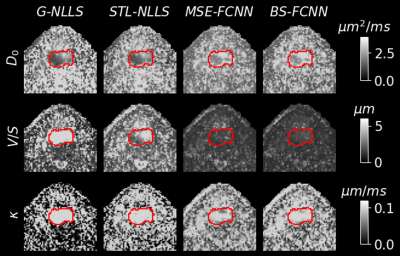 |
Computer Number: 77
3888. Deep
Learning-Based Estimation of Tumor Microstructure Parameters in
Head and Neck Cancers
J. Zou, Y. Cao
University of Michigan, Ann Arbor, United States
Impact: The improvement in parameter quantification
accuracy and precision of the random walk with barrier model
by DL methods will facilitate a clinical application in
anti-cancer treatment response assessment in head and neck
cancers, potentially benefiting adaptive therapy.
|
|
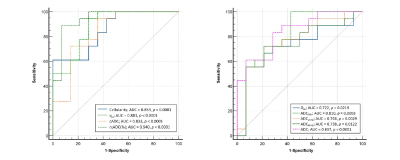 |
Computer Number: 78
3889. Time-dependent
diffusion MRI: More effective than conventional DWI in
differentiating benign and malignant soft tissue tumors
Z. Yan, J. Zhao, X. Feng, M. Wang, M. Chen, T. Feiweier, H.
Yu
The Third Hospital of Hebei Medical University, Shijiazhuang, China
Impact: Time-dependent diffusion MRI can effectively and
non-invasively assist in distinguishing benign and malignant
STTs, and its diagnostic effect is superior to
conventional DWI. This progress is expected to promote
understanding of tumor characteristics, which will help
select appropriate treatment strategies.
|
|
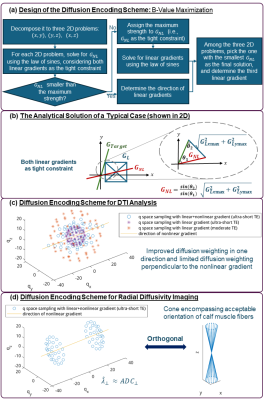 |
Computer Number: 79
3890. Microstructural
Imaging with a Nonlinear Gradient: Pushing the Limit of Short
Diffusion Time
H. Zhang, E. Fieremans, D. Novikov, A. Sinusas, G. Galiana
Yale University, New Haven, United States
Impact: With the high strength of nonlinear gradient,
this study reveals time-dependent diffusivity of the calf
muscle at short diffusion times, and sheds light on
microstructure of the calf muscle non-invasively.
|
The International Society for Magnetic Resonance in Medicine is accredited by the Accreditation Council for Continuing Medical Education to provide continuing medical education for physicians.